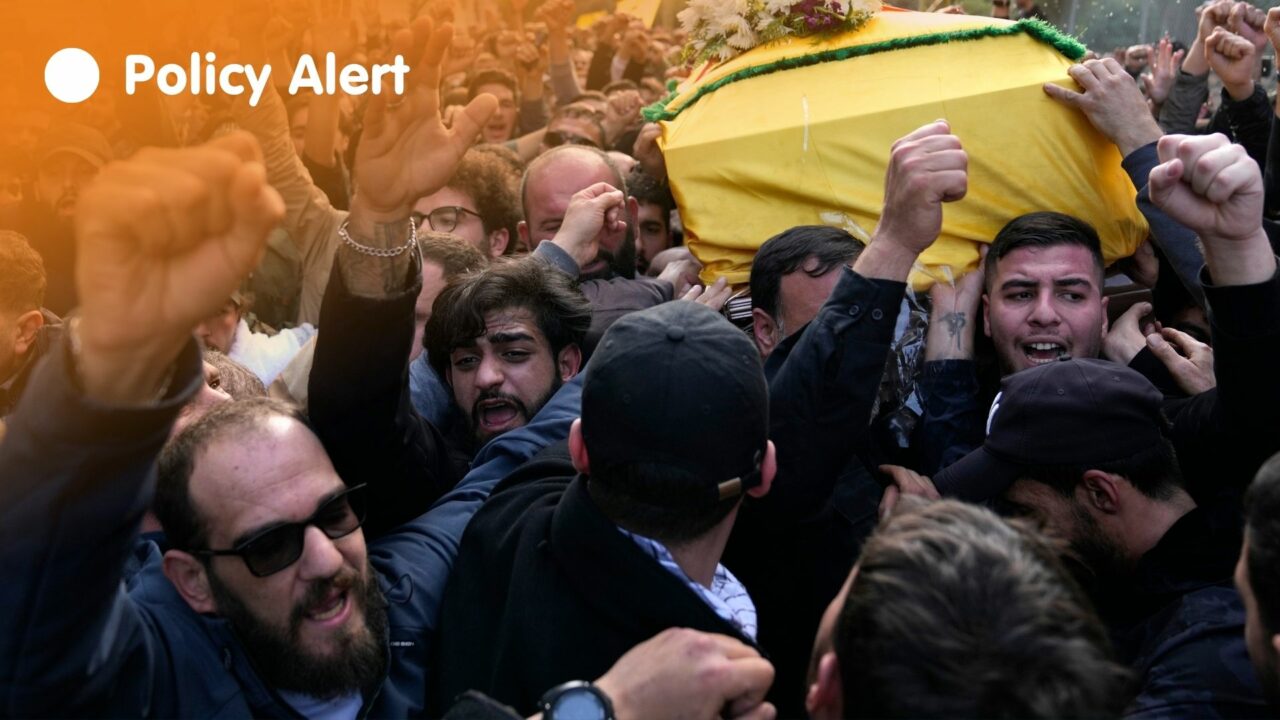Averting a wider war: Three ways to address the Israel-Hizbullah confrontation
Hizbullah and Israel stand on the brink of a devastating war. Despite protracted fighting since Hamas’s 7 October attacks, both sides have avoided full-scale conflict. However, Israel’s recent campaign of targeted assassinations against senior Hamas, Hezbollah, and Iranian figures is feeding an intensifying escalatory cycle, as are attacks by Iranian-backed groups such as the Houthis in Yemen. The prospect now looms of US and UK military strikes against the Houthis in response to their attacks on Red Sea shipping.
There is now a high risk of a widening regional war that could drag in the United States and Iran and directly challenge core European interests linked to regional stability, security threats, and critical economic passageways.
Assassination escalation
Israeli officials increasingly warn of their determination to remove the threat posed by Hizbullah on their northern border and restore the country’s military deterrence. There is no doubt that Israel has security concerns, with Hizbullah attacks having killed a number of Israeli soldiers and forced the evacuation of 80,000 Israeli residents from the Lebanese border. But Hizbullah, and its key backer Iran, have made clear they want to avoid a full conflict with Israel. They have limited their attacks to Israel’s border areas as part of a desire to maintain pressure on Israel to end its military campaign in Gaza, all while keeping to unstated rules of the game to prevent wider escalation.
These rules of the game appear to have been upended by Israel’s recent assassination campaign in Beirut, southern Lebanon, and Damascus. The US also recently killed a senior member of the Iraqi Popular Mobilisation Force, who it accused of directing attacks against its forces in Iraq and Syria. To maintain their own sense of regional deterrence, Hizbullah and Iran will now be under growing pressure to respond more emphatically to these attacks.
What Europeans should do
Firstly, Europeans need to urgently step up their diplomatic efforts. Shuttle diplomacy by the European Union’s high representative Josep Borrell, who recently met with the head of the Hizbullah parliamentary bloc and spoke with the Iranian foreign minister, offers an important entry point for intensified European efforts to draw Hizbullah and Iran away from the precipice. This should include more active and high-level engagement from key European leaders.
Next, Europeans need to communicate a strong warning to Israel against escalation. In the present circumstances, an Israeli decision to initiate a wider war with Hizbullah should be seen as an act of choice rather than necessary self-defence given the limited threat posed by Hizbullah’s current positioning. Europeans should signal to Israel that if it chooses this path, as some in the Israeli government appear intent on doing, it will do so without European support. Europeans should press the US to outline a similar position. The US government’s current pledge to back Israel militarily against Hizbullah and Iran if conflict widens is a handmaiden to escalation.
Finally, immediate diplomacy is critical but will struggle while the war in Gaza continues. Three months since it began, and with more than 20,000 Palestinians dead in Gaza, the conflict remains the core driver of regional escalation. The unwillingness of key European states including Germany and the United Kingdom to support an immediate ceasefire is morally and strategically untenable. Without an end to the Gaza conflict there will no viable way to prevent insecurity from spreading, including in the Red Sea.
The European Council on Foreign Relations does not take collective positions. ECFR publications only represent the views of their individual authors.



